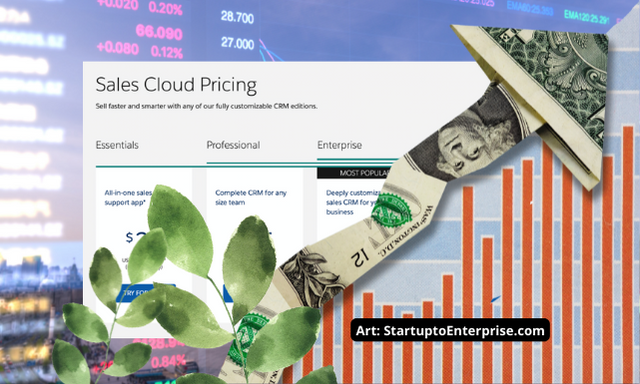

In 2022, Salesforce has reported total fiscal revenue of $26.49 billion. It is 25% year-over-year and 24% in constant currency. The company generated $24.66B from subscription and support revenues for the year, up by 23% year-over-year. Other revenues & professional services are reported to be $1.84B, which is 44% year-over-year.
Quoting Salesforce’s FY2022 revenue serves our purpose as it helps startups and emerging enterprises learn a few lessons from the world’s biggest and most profitable software company. Now arguments are expected as we compare average startups to an enterprise giant Salesforce with billions in revenue earned by smart employees. But here’s the thing that defines the above speculations. To begin with, it is Salesforce’s transparent pricing policy, an insignificant part of the entire engine yet the most crucial one.
How does Opaque Pricing Policy Deter Revenue?
Certain Saas (software as a service) Startups employ a marketing strategy that refrains from sharing pricing information openly. The underlying mission is to create intrigue, fill a form, and then use the data for email marketing if the sign-up doesn’t happen in one go. The strategist behind this forgets how the lack of pricing transparency policy negatively impacts revenue.
First, let us agree that pricing is one of the first and, in many cases, the most important qualifying factor in the decision-making process. The features, quality, and capabilities of a product are all important considerations. Customers want to confirm that a product is of interest to them by determining whether or not it is within their price range. Consumers have many alternatives for purchasing decisions, and your company is unlikely to be one among them.
Does Transparent Pricing Policy Guarantee Sales?
The journey with determining the best price starts early with consumers; that’s where they start even before they get into core features. And this is where many small businesses and startups lose out. They fear a transparent pricing policy will help competitors use the pricing information against them.
The above mindset explains the focus of the startup founder, which is not the customer but the competitor. With the fear of withholding pricing information to save business intelligence from the knowledge of the competitors, startup founders lose out on their eventual revenue. In this bargain, pricing strategists who withhold pricing forget that even after a sign-up, a customer can very well disclose the whole pricing bit.
From Salesforce marketing practices, it is evident that concealing pricing for fear of competition would not be as effective as improving the product offering. Again, pricing alone doesn’t help the revenue unless the unique selling point of the offering is distinct in the market. You get started with the pricing to reveal the USPs and keep the pricing competitive incrementally.
Can Explicit Mention of Prestige Pricing Kill Business?
Some of us are accustomed to associating a lack of transparency in pricing with a high price tag. Its high price will not put off consumers who believe that a product’s value equals its price. Psychologically, a high price is directly proportionate to the desire of the consumer to purchase the product. A high price becomes a selling point when it is justified.
A lack of pricing transparency can result in a poor user experience for those considering becoming customers when it comes to startups. Furthermore, it sends strong psychological (and largely subconscious) signals to your customers that your product or service is expensive or that the item’s worth does not justify its asking price.
And if you are not confident enough in your pricing to make it publicly available, it appears as though you agree that it is not worth the time and effort. In the same way that you are not confident in what you are offering, a customer will not be confident in your company.
Why Doesn’t Salesforce Fear Competition?
Historically, product-minded startups are least bothered about competition because the focus is on their product or service, which is by far the best in the market with a loyal customer base.
Salesforce is not shy about disclosing their cloud pricing because they understand their worth like their target audience. Although achieving this benchmark in the early stages of a startup may be difficult, the process gets only difficult if the pricing structure is not defined as transparent.
Instead of concealing the pricing, many small businesses and startups can learn from Salesforce ways to improve the company’s offering or improve communication effectiveness.
Dear Reader,
First, thank you for your precious time reading the stories (without paywalls) I publish on Startups to Enterprises covering the EU, China, the US, and India. Second, I request you to contribute financially (any amount) to help me sustain this as an independent digital business news media.
If I receive a request for a sponsored post, I ensure I see merit that is meaningful for erudite and informed readers like you. In the bargain, I lose out on sponsorships wherein I need funds to sustain this effort. Your contribution helps me stay afloat.
Please note that your contribution is treated as revenue generated and not a donation; hence, there are no 80G or other donation certificates. In fact, as I am eligible to pay for the revenue generated, I will pay taxes on the same.
You deserve to know that I abide by journalistic ethics and practices to ensure I tell the stories as is, unbiased. You can follow us on Facebook, Linkedin, and Twitter, bookmark us on Google News, and finally, PayPal us here.
Founding Editor
Linda Ashok

